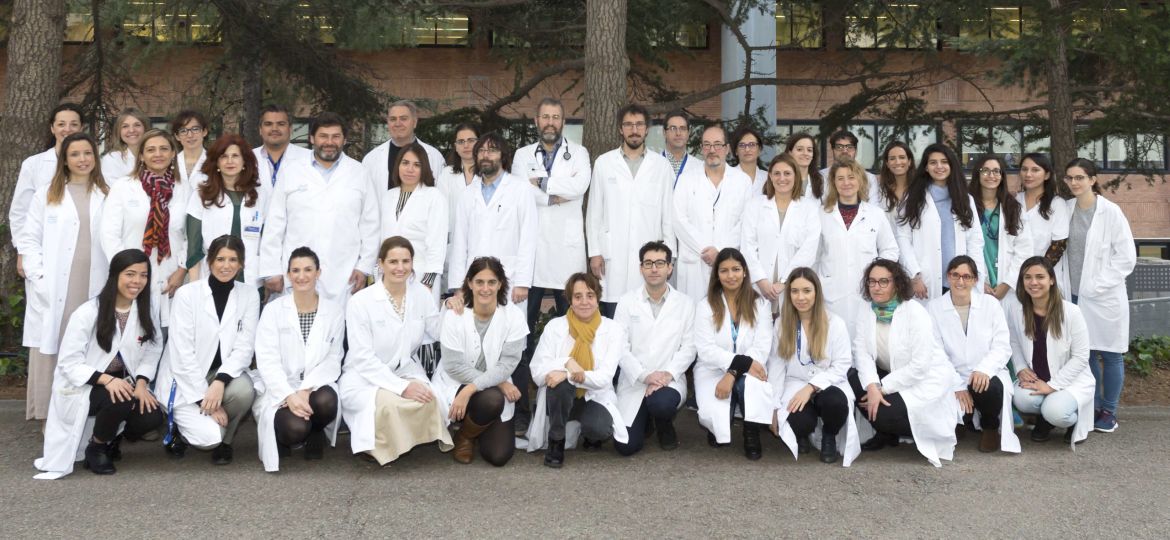
- Vall d’Hebron has participated in the first Phase I clinical trial for iadademstat, a new potent and selective LSD1 inhibitor with antileukaemic activity, the results of which lay the foundations for the development of new therapeutic strategies for acute myeloid leukaemia
- This compound has demonstrated a satisfactory safety and tolerability profile in monotherapy in patients diagnosed with refractory acute myeloid leukaemia
Barcelona, 22 October 2020.– A new LSD1 inhibitor, iadademstat, has demonstrated safety and tolerability for the first time in humans in patients with refractory acute myeloid leukaemia (AML) or AML that is resistant to first-line treatment with chemotherapy. This represents a novel alternative therapy for this disease, which has a dreadful prognosis for many patients.
Iadademstat, a molecule that is involved in DNA methylation and induces the differentiation of leukaemia cells, has shown positive results in the non-randomised phase I of the open-label trial ORY-1001, which evaluated its safety, pharmacokinetics, pharmacodynamics and antileukaemic in two cohorts of patients with refractory AML. The results of the study, in which Vall d’Hebron Instituto de Oncología (VHIO) – a part of the Campus Vall d’Hebron [Vall d’Hebron Campus] – played a crucial role, opens the door to a potential new treatment for these patients. The results of this study were published very recently in the Journal of Clinical Oncology, published by the American Society of Clinical Oncology.
A study for patients with relapsed or refractory AML
The study, in which a total of 41 patients with relapsed or refractory AML participated, evaluated the safety, tolerability, efficacy and preliminary antileukaemic activity.
The main objective of the study was to determine the maximum tolerated dose that is safe and effective for all patients. To do this, patients were divided into two groups, 27 in the dose escalation phase following the regular recruitment regimen in cohorts with low patient numbers (3+3), and 14 additional patients in an extension phase.
With the connection between the drug objective and the side effects in mind, a dose of 140 µg/m2/d of iadademstat in monotherapy was chosen, to be administered orally on days 1 to 5 of each week continuously, unless toxicity required the drug to be stopped. “As is to be expected in treatments for this disease, every patient had one or more side effects during the study, although it should be noted that the majority were not related to the drug and no substantial extra-haematological toxicity was observed. This means that the drug may be a good candidate to be combined with other drugs that have started to be used with AML recently”, explained Dr O. Salamero.
An effective, specific treatment
As with other LSD1 inhibitors, iadademstat has been shown in preclinical studies to take specific and potent action in DNA acetylation and can induce the differentiation of tumour cells. In this study, these same findings were confirmed for the first time in patients affected by AML.
“Only one patient achieved complete remission and, while these results may appear poor, managing the relapsed and refractory disease in monotherapy is unlikely. What was significant about the study was that a potent ability to inhibit DNA acetylation and differentiation induction in the majority of patients in the study, even with doses below 140 µg/m2/d, which made it possible to confirm that, once it is fixed to a safe and effective dose, iadademstat may play in important role in treatment AML in combination with other drugs, even in first-line therapies”, argued Dr Olga Salamero. As such, it is a highly promising drug and a phase II clinical trial has begun, with very encouraging preliminary results”, concluded Dr. Salamero.
Reference:
Salamero O, Montesinos P, Willekens C, Pérez-Simón JA, Pigneux A, Récher C, Popat R, Carpio C, Molinero C, Mascaró C, Vila J, Arévalo MI, Maes T, Buesa C, Bosch F, Somervaille TCP. First-in-Human Phase I Study of Iadademstat (ORY-1001): A First-in-Class Lysine-Specific Histone Demethylase 1A Inhibitor, in Relapsed or Refractory Acute Myeloid Leukemia. J Clin Oncol. 2020 Oct 14:JCO1903250. DOI: https://doi.org/10.1200/JCO.19.03250. Epub ahead of print. PMID: 33052756.








